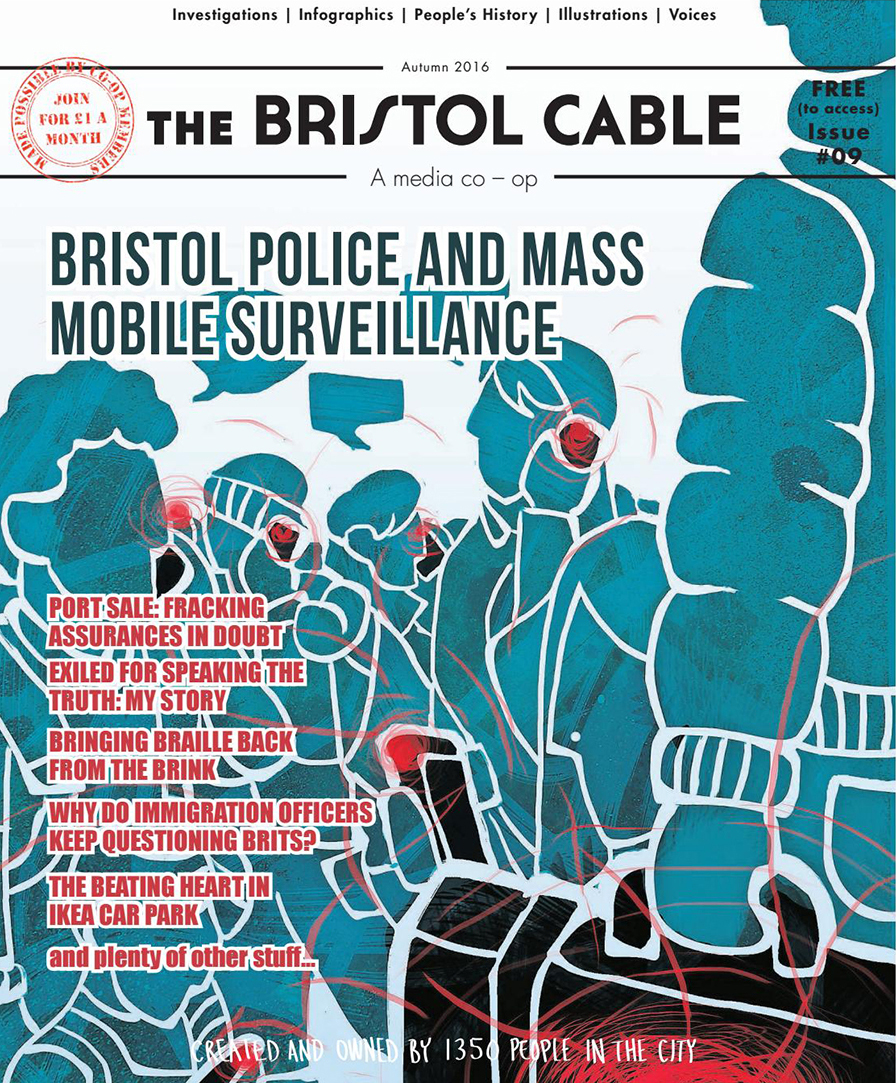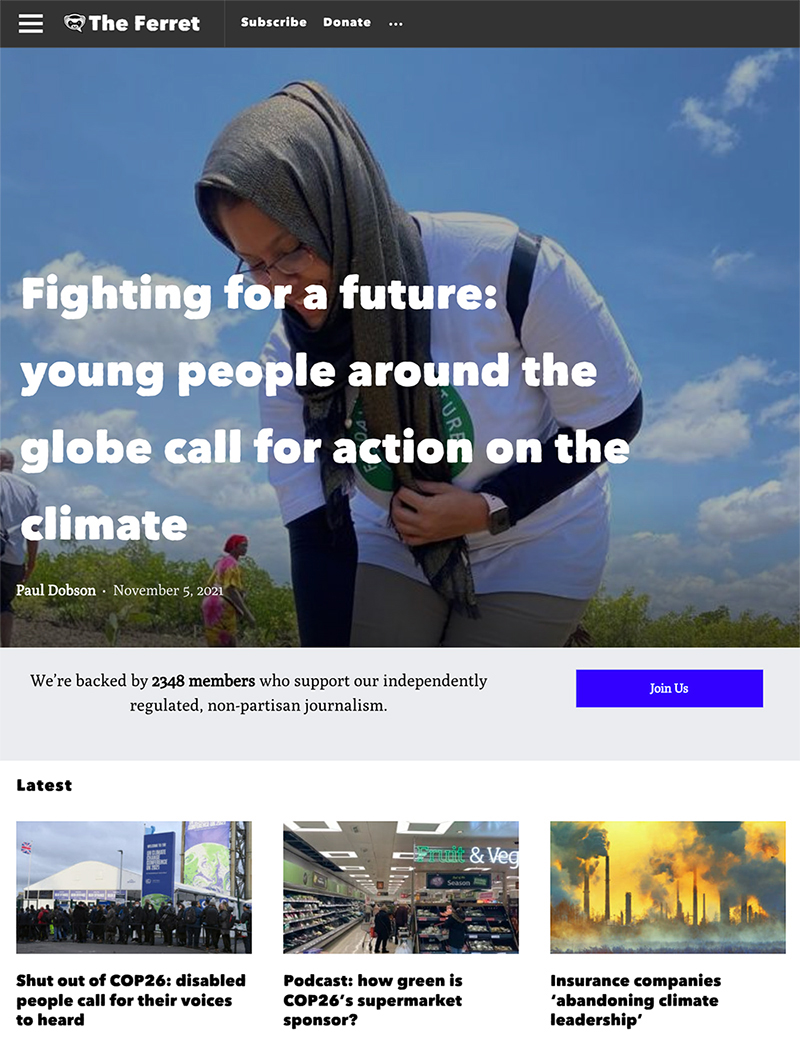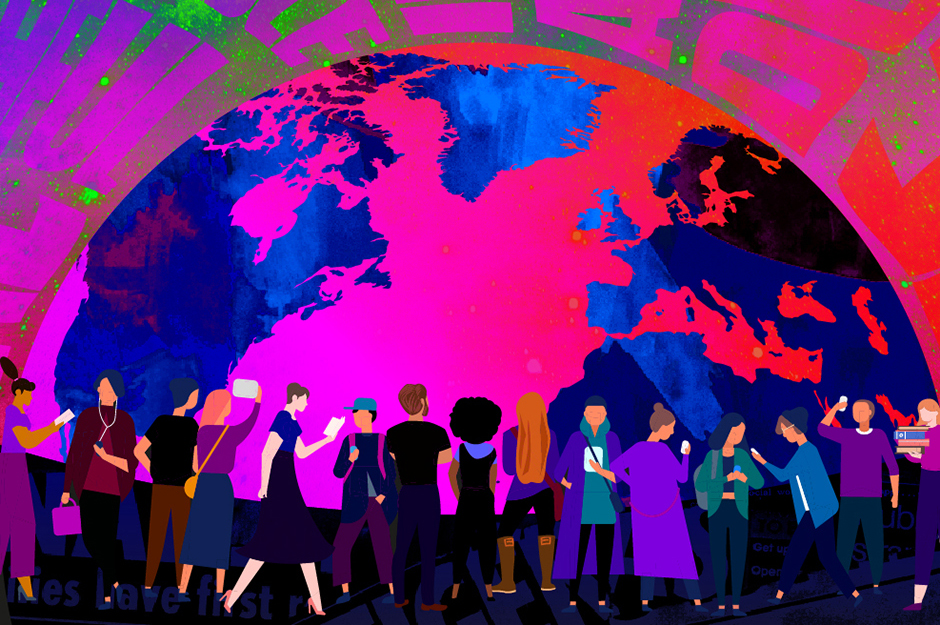A commons is a collective resource sustained through the active participation of those who rely on it. In a media commons, our media would be funded through democratically-controlled public resources, and managed collectively so they serve our needs and help us face the challenges ahead.
Our Manifesto for a People’s Media outlines a vision for a media system with the public interest, community empowerment and collective care at its heart, containing a transformed People’s BBC and People’s Channel 4 alongside a thriving ecology of independent media. Learn more about our vision of the media commons and how we wrote the Manifesto.
In a media commons, all our media would share common values, and practices for living out those values. Learn more about our vision of a media system that is independent, accountable, democratic and for everyone.
The tech giants that dominate the internet today aren’t the only way our digital technologies could be. Learn more about alternative visions for how tech and data can be controlled by communities, not corporations.
The media commons might sound very far from the media we have today, but the seeds of it already exist. Learn about how democratically-run community media, media cooperatives and open-source digital innovation are paving the way for a new kind of media system.
As part of the BBC & Beyond campaign, our movement building conversations bring together those creating alternative media infrastructures, and those from wider social justice movements, to strategise about how to transform our media systems.
Our work on the media commons
– Manifesto for a People’s Media
Outlines our vision for a media system with the public interest, community empowerment and collective care at its heart. Read Manifesto
– ‘Creating a Media Commons’
Event at the Media Democracy Festival 2022, with Lexie Kirkconnell Kiwana, Shirish Kulkarni and Clive Lewis MP. Watch event
– BBC & Beyond Podcast, Episode 2: Transforming to a Media Commons
Listen to our podcast exploring how UK media could work as a commons, and how private monopolies need to be challenged to make that possible. Listen on Soundcloud
Manifesto for a People’s Media
This manifesto comes out of the Media Reform Coalition’s campaign The BBC and Beyond: Reimagining Public Media. In 2021, we held a series of public events around the UK and interviewed to dozens of organisations and individuals – including those working at the BBC and Channel 4 – about their vision of how public media in the UK could be made fit for the future. Around 30,000 people took part in these events. Based on these conversations, we wrote a Manifesto for a People’s Media which was published in November 2021.
In our conversations and events we heard many important, concrete proposals for our current media system could be improved. But we also heard of the need to think bigger – to recognise that the kind of society that can rise to meet the crisis ahead looks very different to today. To reflect these concerns, the Manifesto for a People’s Media is structured around three timeframes:
- The Bigger Picture:outlines our long-term vision of the kind of society that can face the challenges ahead – one which is far more devolved and participatory, that centres collective ownership and is based on transnational solidarity. And it describes what media would be for in this society, supporting communities to understand each other and collaborate to solve social issues.
- Imagining the media commons: outlines our vision for a media commons. This would contain a transformed People’s BBC and Channel 4, which have become far more democratic, responsive and accountable to citizens. And it would also contain the Independent Media Commons – a thriving ecology of participatory newsrooms, community radio stations, digital innovators and cultural producers, supported by new sources of democratically-controlled public funding so they can be present in every community.
- Building the media commons: outlines concrete proposals that could be implemented now. Proposals for supporting independent media range from increasing funding for Community Radio, supporting community buyouts of local commercial newspapers under threat of closure, and creating a network of Data Trusts to steward data for the public benefit. Proposals for our public broadcasters include ending government appointments to the BBC, Channel 4 and Ofcom, protecting Channel 4 from privatisation, replacing the licence fee with a progressive levy where wealthier people pay more, and creating new avenues for participation by the public.
Alongside these there are a series of case studies, covering examples like media cooperatives, community radio, how universities can act as media hubs, and the Welsh language channel S4C. These show that while the vision in the manifesto may be ambitious, many of these ideas are already being tried, are emerging or have existed in the past.
The Manifesto connects current demands for the reform of media policy to a broader vision of societal change, to mobilise a broad cross-section of civil society to campaign for a people’s media which is capable of serving the publics’ interests rather than those of billionaire media owners or political elites.
There are many reasons for pessimism in the current moment, but there is no denying that change is coming. Our future could be further dominated by media and tech monopolies, who have no sustainable answers to the challenges we face. Or it could be a future defined by common ownership and working together to manage the resources, like our media, that we all rely on. We believe that the media commons is the future that we need – and that taking the first steps towards building it requires the kind of imagination and vision encapsulated in the Manifesto for a People’s Media.
Common values and practices
In a media commons, all our media would share common values, and practices for living out those values. These core values would include being:
- Independent
- In a media commons, our media would be truly independent, able to scrutinise the actions of the powerful and inform the public so they can be held to account. This means being independent of politicians and political parties, and also free from commercial pressures which often lead to media organisations ignoring the needs of poorer communities and minorities. Commoning practices for ensuring independence would include making sure government doesn’t have a say in where funding (like the BBC licence fee) goes or how much it is, and guaranteeing strong worker rights for media workers.
Learn more about what independent media could look like here
- Accountable
- In a media commons, media would accurately represent people and issues, correct their mistakes and take responsibility for any harm they cause. They would be invested in holding high standards rather than trying to get away with as much as possible, and try to make sense of the complexities of the stories they tell rather than repeating stereotypes. Commoning practices for ensuring accountability would include citizen involvement in defining harm and what is meaningful redress, and a right of reply for those who have been harmed.
Learn more about what an accountable media could look like here
- Democratic
- We need media which fully represent the communities they serve – and which allows them to participate in creating the media they need. In a media commons, underrepresented groups would be supported to work and stay in the industry, and would have a stronger role in decision-making through less hierarchical and more democratic structures. Wider communities would be able to participate by being members of media coops, sitting on citizen juries or directly electing boards. Learn more about what a democratic media could look like here.
- For everyone
- In the media commons everyone would get the information and cultural content that they need, while also creating shared spaces for engaging with the issues that affect us all. A media system that was for everyone would be technically and socially accessible to all communities – for example, by having high accessibility standards on all websites, and making affordable full fibre broadband available to all households. Learn more about what universal media could look like here.
Commoning practices
In a media commons, our media would not just hold these values but they would have a set of practices for living them out – practices known as ‘commoning’. There are many examples of media organisations that already live out some or all of these values, such as media cooperatives. Here’s how two coops in different parts of the UK living out being independent, accountable, democratic and for everyone.

The Bristol Cable
The Bristol Cable is a grassroots, community-led media cooperative founded in 2014. They produce a free quarterly magazine with a circulation of approximately 30,000 copies, and investigative and community-led journalism online. They prioritise holding power to account through investigations, raising up marginalised voices, and community engagement.
The Cable is owned by over 2,600 members who each pay a small monthly fee and are equal legal owners. Members select member-Directors who provide guidance and accountability to the staff team. Members are also involved in decisions which help guide the direction of the organisation, such as what kind of journalism the Cable should prioritise, and whether they should take funding from certain sources.
The Cable believes that having members isn’t just a good way to fund journalism but improves what gets produced. Through regular call outs, the Cable engages with members and wider communities to inform articles, aiming to draw on the opinions, experiences, and expertise of the people and communities affected by stories.
The impact of this different kind of reporting was clear during the Kill the Bill protests in Bristol in early 2021. Reporters from the Cable were present on the ground and able to give more accurate coverage. For example, unlike other media they didn’t reproduce police press releases which misrepresented the number of police injuries.
The Cable is:
- Independent:Not-for-profit and funded by a mix of member contributions (35%), grants (60%) and advertising
- Accountable:Though members revenue and the member Director board, the organisation is directly accountable to its members
- Democratic:Voting on the annual budget, board of directors and overall focus at the yearly AGM; a board of reader members; a collectively-decided ethical advertising charter
- For everyone:All the content is freely available and they’re working hard to make their journalists more representative of the communities they serve

The Ferret
The Ferret is an online investigative platform in Scotland. It was founded in 2015, to try and address the lack of civic infrastructure in Scotland, and make sure that Holyrood is developing good policy and being held to account. Like the Bristol Cable, it is a cooperative owned by its members. There are journalist members and reader members, who elect different directors who have different responsibilities – the journalist directors have editorial control, and reader directors deal with complaints.
The Ferret is nonpartisan, including on the question of Scottish independence. In the 2014 referendum, media in Scotland became increasingly polarised on unionist/independence lines, and many saw the BBC as biased in favour of Scotland staying in the union. The Ferret hopes that by acting in a democratic and accountable way they will be trusted by people across the debate, and able to provide a broad, shared knowledge base whatever decisions Scotland makes about its future.
The Ferret is:
- Independent:Not-for-profit and funded by a mix of member subscriptions, grants and advertising; nonpartisan, including on the question of Scottish independence
- Accountable:Regulated by IMPRESS; reader directors make decisions on complaints
- Democratic:Members elect directors at the yearly AGM; members can submit ideas to the website, and upvote other people’s ideas; focus groups help frame stories
- For everyone:Content is behind a pay wall, but there are free subscriptions available for those who can’t afford to pay
Digital and data commons
The World Wide Web was designed to work as a commons – a space where peer-to-peer sharing and collaboration were the default, and it was easier to spread ideas and information freely than to privatise and monetise them. But the internet as we know it today has been enclosed by private companies, just as common land was enclosed and ended up in the hands of a wealthy few. Most of the digital spaces we inhabit today are ‘walled gardens’ that exist to generate huge profits for a handful of corporations, rather than commons that serve the collective good.
In our Manifesto for a People’s Media, our vision of a media commons is underpinned by a different kind of digital infrastructure which is owned and governed collectively. This digital commons would be made up of surveillance-free platforms allowing us to connect, collaborate and search for information without huge data profiles being created to sell back to advertisers. Data that was collected would be used for the public good, for example to improve public services or address social exclusion. This digital infrastructure would connect a vibrant ecology of news and cultural producers from the Independent Media Commons, allowing a greater diversity of voices to be heard.
A British Digital Cooperative
In his Alternative McTaggart lecture in 2018, Jeremy Corbyn called for a new British Digital Cooperative alongside the BBC “to rival Netflix and Amazon, but also to harness data for the public good.”
Creating platforms that can take on the tech giants will need a huge amount of investment – an institution on the scale of the BBC that can identify needs, build and test products and communicate the benefits of moving away from corporate platforms. Read more about how a British Digital Cooperative could work here.
Data Trusts
Our daily actions create enormous data trails which could help us deal with the huge social challenges we face, but at the moment it’s mostly the tech giants that benefit. Data Trusts would be a new kind of public institution that would collect and aggregate our data and ensure it was used for the public good rather than private profit. Learn more about Data Trusts here.
Protecting Open Source
Open source software – where the code is made publicly available and can be repurposed and improved by anyone – is one of the ideas from the days of the World Wide Web that has survived into today’s privatised Internet. In fact, it’s such an efficient way to create code that many of the tech giants use it for parts of their operations. The digital commons will need new structures and protections to prevent private companies from profiting from open source innovation. Read more about open source software within the digital commons here.
Case study: public digital media in Taiwan
Taiwan has been leading experiments with digital democracy since 2014, when activists involved with the Sunflower Movement were invited to collaborate with government. Using a platform called vTaiwan, citizens have been able to inform and guide government policy on a range of issues, such as whether Uber should be allowed to operate in the country. vTaiwan is hosted on an open source platform called Polis, which is designed to help groups find consensus, unlike commercial platforms which highlight the most divisive and controversial content in order to keep people clicking. During the pandemic, the advantages of having public digital infrastructure which contributes to constructive relationships between citizens and government have become very apparent. Watch digital minister Audrey Tang described their approach:
The Independent Media Commons
Our Manifesto for a People’s Media outlines a vision for a media commons containing a transformed People’s BBC and People’s Channel 4 alongside an Independent Media Commons.
The best examples of ‘media commoning’ today can be found within independent and community media organisations. As described in the Manifesto’s case studies, there are many examples of media cooperatives, community radio stations and open source digital innovators showing how communities can successfully manage shared resources to serve the common good, which can be seen as the beginnings of an Independent Media Commons. But significant investment is needed to expand and develop them into a thriving ecology.
A flourishing Independent Media Commons would connect these kinds of initiatives and institutions le uniform system, it would be present everywhere. Imagine if every high street had a media hub where journalists could meet residents who had a story to tell, and support them to investigate local issues with their neighbours. Or imagine if every town had a bustling community radio station, which worked with theatres and schools to produce radio plays on the topics local people thought were important.
The Independent Media Commons would have a supportive and collaborative relationship with our national broadcasters. Some high-cost formats such as full-length dramas would continue to be made by legacy broadcasters, but short form video content produced from the Independent Media Commons would have prime-time slots.
Initiatives in the IMC would continue to generate their own income through ethical advertising, subscription or other business activities, but would also be able to access significant new public funding of £1 billion a year. These would be distributed through a network of Regional and National Media Councils to support news, cultural content and digital innovation. All projects funded would be Open Source and/or released under Creative Commons licences, so others could repurpose them in creative, non-commercial ways.
The IMC would be held to the values of the media commons in numerous ways. It would be:
- Independent
- Maintaining the independence of the IMC would be paramount, recognising that relying on public money can distort the way that media work (just as having to serve commercial interests can distort it). Mechanisms for ensuring independence would include devolved and participatory decision-making for how money was distributed, having independence as a key criteria for receiving funds, and having strong safeguards around profit-making and community ownership of assets to prevent commercial players from exploiting this.
- Accountable
- regulation should be undertaken by a network of independent bodies sitting at the same scale as funding and decision-making, with a national ombudsman as a backstop. News journalism organisations should be members of a Leveson-compliant regulator such as IMPRESS. However, the main thrust of accountability should be towards communities, who should be enabled to define harm and determine what constitutes appropriate redress.
- Democratic
- funding distributed through the National and Regional Media Councils should use participatory methods to evaluate and select applicants, drawing on participatory budgeting, participatory grantmaking and digital citizenship initiatives. This could take different forms, for example by having an elected board, selecting participants randomly from the electoral roll, or using digital tools to bring large groups to consensus (as in Taiwan). The key criteria for distributing funds should be the extent to which applicants fit with the principles of the media commons – how are they independent, accountable, democratic and serving everyone within a given community.
- For everyone
- All content funded by the Media Councils should be shared on platforms with strong accessibility principles, and freely available and reusable under Creative Commons licences.
Movement building for the media transition
As part of the BBC & Beyond campaign, our movement building conversations bring together those creating alternative media infrastructures, and those from wider social justice movements, to strategise about how to transform our media systems.
The media we have today are dominated by some of the most unaccountable and antidemocratic companies on the planet. Whether it’s our newspapers, broadcasters or the tech giants, they are an intrinsic part of the extractive capitalism that’s fuelling rampant inequality, social fragmentation and the climate crisis. Even our public broadcasters, the BBC and Channel 4, are increasingly run on commercial lines and mirror many of the problems in private companies.
For organisations fighting for social justice, therefore, most of our media is the opposite of the world we’re fighting for – and part of the forces preventing that world being built. Yet in our own campaigning it can feel impossible not to try and benefit from the ‘reach’ of corporate social media platforms or put resources into getting mainstream media coverage. This is an ethical problem, as we continue to prop up corporations that are causing huge amounts of harm, and it’s also a strategic and logistical problem. We can’t get to a better future by relying on media organisations that are so invested in the status quo they are incapable of making sense of the crisis we’re in, or by communicating via platforms which foster fear and distrust and undermine solidarity.
Just as we need an energy transition, we also need a media transition – a fundamental shift to different ways of distributing information, building deliberative solidarity and developing shared understandings of the world. To make that transition we need the equivalent of renewable energy for media – an alternative media infrastructure that will serve our current and future needs and enable us to disengage from corporate media.
The building blocks of this alternative infrastructure do exist, but they tend to be precarious, isolated and underfunded, and lack strong connections to broader movements fighting for social justice. And it can be hard even for those deeply embedded in building alternatives to imagine what this infrastructure could look like as a functioning large-scale ecology, when it needs to be so different to the media we have today. Making the transition will require these alternatives to be re-envisioned, strengthened and invested in so that they become a viable infrastructure that can end our reliance on corporate platforms and become part of solving the crises we face.
Over two years from 2022-2024, this project brings together a range of organisations to create a collective vision of the media we need to build, connect with and support those already building alternatives, and strategise about how to redirect resources away from corporate media. Read more about the conversations so far here.




